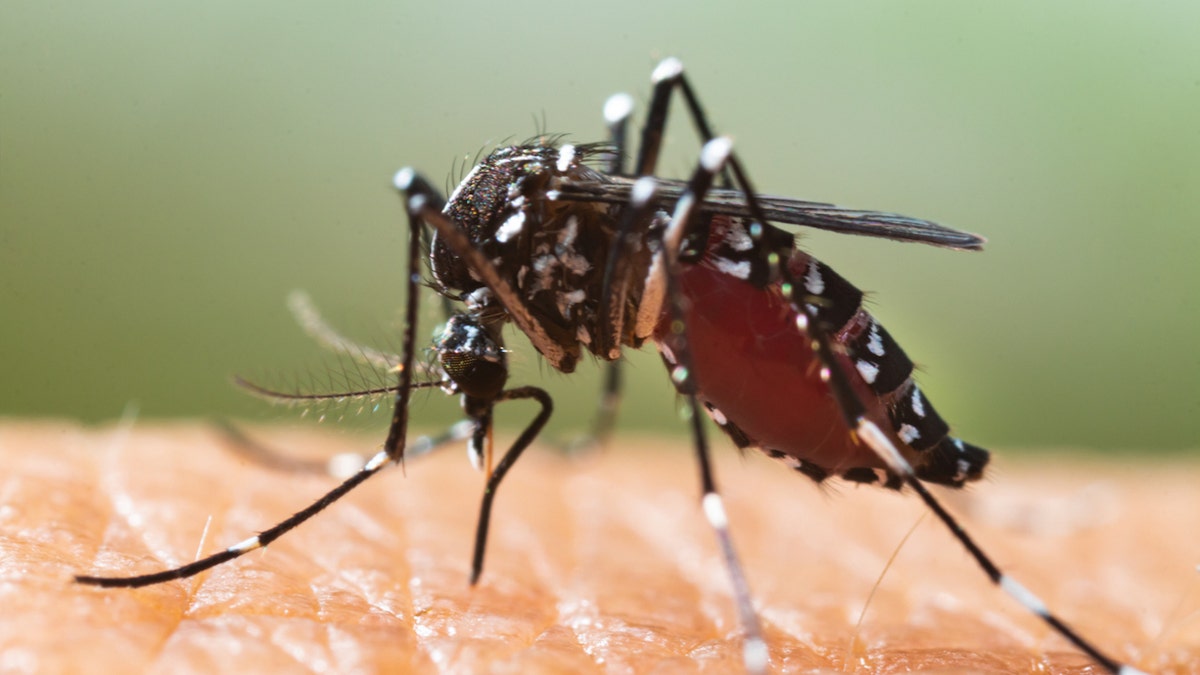The Centers for Disease Control and Prevention (CDC) on Tuesday reported 21 cases of Oropouche virus disease, also known as sloth fever, in travelers returning from Cuba.
Twenty cases have been reported in Florida and one in New York.
The disease is spread primarily through bites from midges and from some mosquitoes. Symptoms of the disease include headache, fever and muscle aches and joint pains, but the virus is rarely fatal.
PARVOVIRUS OR ‘SLAPPED CHEEK DISEASE’ IS ON THE RISE, CDC WARNS: HERE’S WHAT TO KNOW

A mosquito on human skin. Some mosquitoes can carry sloth fever and give it to humans via bites. (iStock)
There is no indication that the virus is spreading in the U.S. but health officials are warning doctors to be on the lookout for infection in travelers coming from Cuba and South America.
Most patients returning from Cuba reported their symptoms between May and July.
Overall, three patients were hospitalized, and no deaths were reported, the CDC said in its Morbidity and Mortality Weekly Report.
A dire economic crisis in Cuba has made it difficult to control the spread of Oropouche. Frequent power outages mean many sleep with windows open during the hot Caribbean summer. Few Cubans have access to insect repellents, and fumigation efforts have been stymied by fuel shortages.
WITH MPOX A PUBLIC HEALTH EMERGENCY IN AFRICA, WHAT YOU MUST KNOW ABOUT INCREASED VIRUS RISK

The health body on Tuesday reported 21 cases of Oropouche virus disease, also known as sloth fever, in travelers returning from Cuba. (Elijah Nouvelage/Bloomberg via Getty Images)
Earlier this month, the CDC issued a Health Alert Network (HAN) Health Advisory about an increase in Oropouche virus disease in the Americas region.
The virus is endemic to the Amazon basin and more than 8,000 cases have been reported in Brazil, Bolivia, Peru, Columbia, and Cuba so far this year, including two deaths, and five cases of vertical transmission, where viruses can pass between mother and fetus.
The CDC has recommended that pregnant women avoid non-essential travel to Cuba and suggested all travelers take steps to prevent bug bites, such as using insect repellents and wearing long-sleeved shirts and long pants. Currently, there are no vaccines available for the disease and treatment for symptoms can include rest, fluids and use of analgesics and antipyretics.
People can become infected when visiting these forested areas and getting bitten. They can then introduce the virus to urban areas, where biting midges and certain mosquitoes spread the virus from person to person.
CLICK HERE TO GET THE FOX NEWS APP

A baby three-toed sloth holds a teddy bear at a wildlife center in Alajuela, Costa Rica. (AP Photo/Kent Gilbert)
Approximately 60% of people infected with Oropouche virus become symptomatic, according to the CDC. The incubation period is typically three to 10 days.
It has sometimes been called sloth fever because scientists first investigating the virus found it in a three-toed sloth, and believed sloths were important in its spread between insects and animals.
The virus was first detected in 1955 in Trinidad and Tobago.
The Associated Press and Reuters contributed to this report.
Michael Dorgan is a writer for Fox News Digital and Fox Business.
You can send tips to michael.dorgan@fox.com and follow him on Twitter @M_Dorgan.